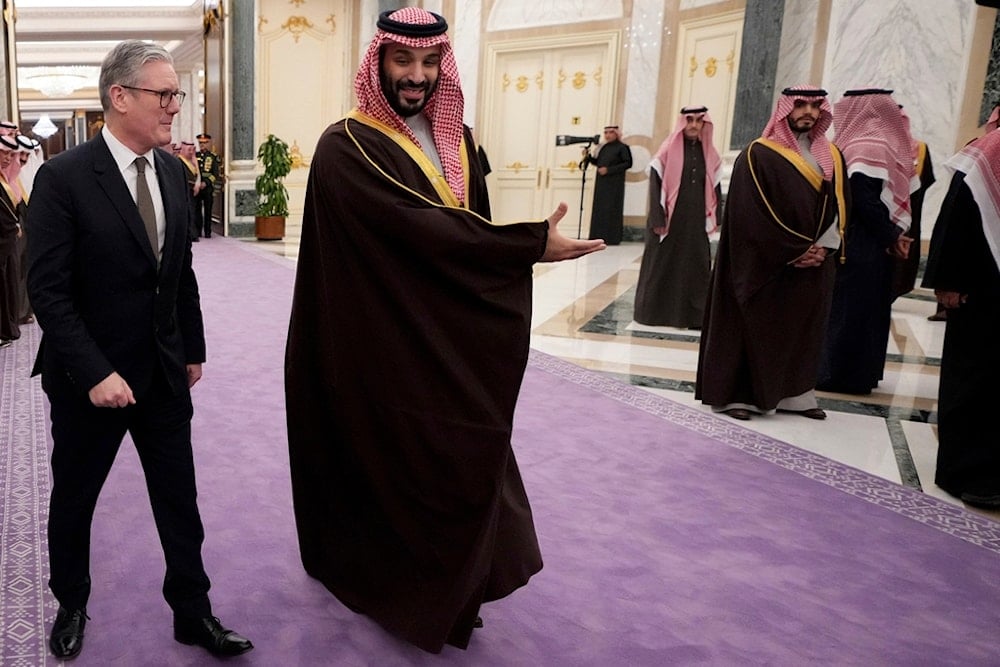Saudi's MBS main 'broker' for Trump's 'new world order': Bloomberg
Saudi Crown Prince Mohammed bin Salman emerges as a key figure in Trump’s plans to end the Ukraine war and reshape Middle East dynamics amid plans for ethnically cleansing Gaza.
-

Britain's Prime Minister Keir Starmer meets Saudi Arabian Crown Prince Mohammed bin Salman Al Saud at the Royal Court in Riyadh, Saudi Arabia, Monday, Dec. 9, 2024 (AP)
As US President Donald Trump pursues an end to the Ukraine war and strategic shifts in the Middle East, one name stands at the center of these moves: Saudi Crown Prince Mohammed bin Salman, Bloomberg reported.
According to the report, bin Salman is among the few global figures who maintain close ties with both Trump and Russian President Vladimir Putin. While many Arab leaders find engagement with Washington increasingly complex, the Saudi crown prince remains a pivotal figure connecting global powers.
This unique position places Saudi Arabia as a likely host for a potential Trump-Putin summit on the Ukraine crisis, Bloomberg noted. Sources close to bin Salman suggest he views Trump's unconventional approach as "an opportunity to resolve conflicts in the Middle East and beyond."
During a meeting with Indian Prime Minister Narendra Modi on Thursday, Trump stated, “Tomorrow, there’s a meeting in Munich, and next week, a meeting in Saudi Arabia—not with me or President Putin, but with senior officials, and Ukraine will also participate.”
While a Trump-Putin summit in Saudi Arabia seems feasible, the crown prince faces a greater challenge in dealing with Trump’s controversial plan to displace Palestinians and occupy Gaza. Balancing ties with Washington and deep regional concerns, Riyadh has maintained its stance on the necessity of a Palestinian state and rejected any forced displacement of Gaza’s population.
Effects of Trumps plan?
Saudi officials, alongside their Arab counterparts, remain deeply worried about the potential refugee crisis, fearing instability in Egypt and Jordan, which could have broader repercussions for the region. They believe the Arab world cannot afford economic or political collapse in either country, as this could force Saudi Arabia and others to step in with financial aid if Trump decides to cut assistance.
Despite these challenges, Saudi Arabia hopes to avert such scenarios, leveraging bin Salman’s strong relationship with Trump—one cultivated during Trump’s first presidency and maintained even after his 2020 election loss.
Meanwhile, Bloomberg revealed that Egypt is working on an alternative plan for Gaza, which is set to be discussed at a five-nation summit in Riyadh on February 20. Egyptian President Abdel Fattah el-Sisi and Jordan’s King Abdullah II are expected to meet with bin Salman to deliberate on the issue, according to Arab sources.
Saudi covering its bases
For the Saudi crown prince, these developments align with his broader agenda, which includes securing US cooperation on defense, technology, and nuclear energy agreements. Washington appears willing to back these initiatives, provided Riyadh agrees to normalize relations with the Israeli occupation.
“Trump’s approach underscores his support for Saudi Arabia’s regional ambitions,” said Anna Borshchevskaya, a fellow at the Washington Institute for Near East Policy. “With his transactional style, he seems poised to capitalize on this relationship.”
Trump’s plan has been widely criticized as unrealistic, particularly due to fears of permanent Palestinian displacement. Some have raised concerns over whether it violates international law, with potential implications of ethnic cleansing.
Israeli Prime Minister Benjamin Netanyahu has embraced Trump’s proposal as "fresh thinking," and the Israeli security minister has instructed the military to draft contingency plans for "relocating Palestinians." However, some captive families fear the plan is complicating ceasefire talks aimed at securing their relatives’ release.
One potential side effect of Trump’s proposal, some officials argue, is that it may spur Arab states into action, as per the piece.
"The blunt truth is that the Middle East has for too long been a region of places all of whom love to talk but don’t want to do," said U.S. Secretary of State Marco Rubio. "If they don’t like Donald Trump’s plan, then it’s time for these countries in the region to step forward and offer their solution."
Trump, meanwhile, remains committed to his vision. "We’re going to take it, we’re going to hold it, we’re going to cherish it," he said during his meeting with King Abdullah.
The former president reiterated his vision of "transforming Gaza into a luxury coastal destination", with hotels and housing for visitors from across the Middle East.

 4 Min Read
4 Min Read









